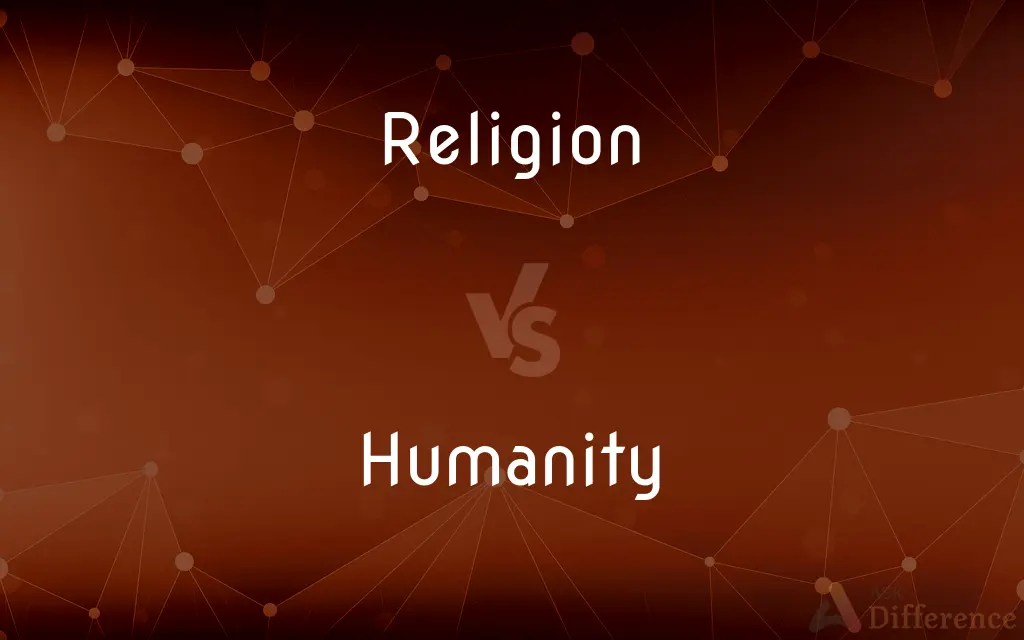Religion vs. Humanity — What's the Difference?
By Urooj Arif & Maham Liaqat — Updated on March 22, 2024
Religion involves beliefs and practices centered around spiritual ideas, while humanity refers to human beings collectively and their qualities.

Difference Between Religion and Humanity
Table of Contents
ADVERTISEMENT
Key Differences
Religion encompasses a wide array of systems that include beliefs, rituals, and moral guidelines based on the worship of a deity or deities, sacred texts, and spiritual experiences. Its purpose often extends to answering fundamental life questions, providing moral direction, and fostering community among its followers. Humanity, on the other hand, pertains to the human race as a whole, emphasizing shared qualities like compassion, empathy, and the capacity for kindness and social cooperation.
While religions can differ greatly in their doctrines and practices, they often advocate for values that uphold the dignity and well-being of individuals, intersecting with the broader concept of humanity in promoting ethical behavior and social harmony. However, humanity as a concept transcends religious boundaries, encompassing the universal aspects of human experience and the innate sense of moral consciousness.
The role of religion in shaping cultures and civilizations is profound, influencing art, law, and social norms. It can unite individuals through shared beliefs and community practices. Humanity, in its broadest sense, reflects the collective experiences, achievements, and challenges of the human race, including the pursuit of knowledge, the struggle for justice, and the expression of creativity and innovation.
Religious teachings often highlight aspects of humanity, such as compassion, forgiveness, and the pursuit of justice, aligning with the intrinsic human values that foster societal progress and individual well-being. Conversely, the study and appreciation of humanity, including its diverse cultures, philosophies, and histories, can enrich one's understanding of religion, revealing the interconnectedness of human beliefs and values across different faith traditions.
In contemporary discourse, the relationship between religion and humanity is complex, with ongoing debates about the role of religion in public life, ethical decision-making, and social policy. This dynamic interplay highlights the evolving understanding of what it means to be human in a world of diverse religious perspectives and the shared aspiration for a society that values compassion, dignity, and mutual respect.
ADVERTISEMENT
Comparison Chart
Definition
Systems of faith and worship, including beliefs, rituals, and moral guidelines
The human race collectively, including its qualities and values
Focus
Spiritual beliefs, deities, sacred texts
Human qualities like compassion, empathy, social cooperation
Role
Provides moral guidance, answers to existential questions, community belonging
Emphasizes shared human experiences, ethics, and social progress
Influence
Shapes cultures, laws, art, and social norms
Reflects collective achievements, challenges, and aspirations
Interrelation
Often promotes values aligning with humanitarian principles
Can be enriched by religious diversity and ethical teachings
Compare with Definitions
Religion
A system of faith and worship, often involving belief in a higher power or powers.
Buddhism is a religion that emphasizes the path to enlightenment.
Humanity
The human race collectively, emphasizing shared qualities and experiences.
Acts of kindness restore one's faith in humanity.
Religion
Includes rituals, practices, and moral codes based on sacred texts or teachings.
The religion's rituals include prayer and meditation.
Humanity
Refers to the qualities that define humans, such as compassion and empathy.
His actions demonstrated a deep sense of humanity.
Religion
Provides a sense of identity, community, and purpose to its followers.
Her religion gave her a strong sense of belonging and purpose.
Humanity
Advocates for human rights, dignity, and ethical treatment.
The organization is committed to promoting humanity and justice worldwide.
Religion
Influences cultural norms, laws, and societal values.
The country's laws were heavily influenced by its dominant religion.
Humanity
The study of human conditions, including cultures, history, and arts.
Her studies in humanity covered various global cultures and philosophies.
Religion
Answers existential questions about life, death, and the universe.
The religion offers explanations for the creation of the world and the afterlife.
Humanity
Reflects the collective achievements and challenges of the human race.
Space exploration is considered one of humanity's greatest achievements.
Religion
(countable) A particular system of such belief, and the rituals and practices proper to it.
Belief system
Islam is a major religion, particularly in North Africa and Southwest Asia.
Mormonism is a new religion, while Zoroastrianism is an old one.
Humanity
The quality of being humane; benevolence.
Religion
Religion is a social-cultural system of designated behaviors and practices, morals, beliefs, worldviews, texts, sanctified places, prophecies, ethics, or organizations, that relates humanity to supernatural, transcendental, and spiritual elements; however, there is no scholarly consensus over what precisely constitutes a religion.Different religions may or may not contain various elements ranging from the divine, sacred things, faith, a supernatural being or supernatural beings or "some sort of ultimacy and transcendence that will provide norms and power for the rest of life". Religious practices may include rituals, sermons, commemoration or veneration (of deities and/or saints), sacrifices, festivals, feasts, trances, initiations, funerary services, matrimonial services, meditation, prayer, music, art, dance, public service, or other aspects of human culture.
Humanity
The human condition or nature.
Religion
The belief in and reverence for a supernatural power or powers, regarded as creating and governing the universe
Respect for religion.
Humanity
Humans considered as a group; the human race.
Religion
A particular variety of such belief, especially when organized into a system of doctrine and practice
The world's many religions.
Humanity
The condition or quality of being human.
Religion
A set of beliefs, values, and practices based on the teachings of a spiritual leader.
Humanity
A humane characteristic, attribute, or act.
Religion
The life or condition of a person in a religious order
A widow who went into religion and became a nun.
Humanity
The languages and literatures of ancient Greece and Rome; the classics.
Religion
A cause, principle, or activity pursued with zeal or conscientious devotion
A person for whom art became a religion.
Humanity
Those branches of knowledge, such as philosophy, literature, and art, that are concerned with human thought and culture.
Religion
(uncountable) Belief in a spiritual or metaphysical reality (often including at least one deity), accompanied by practices or rituals pertaining to the belief.
My brother tends to value religion, but my sister not as much.
Humanity
; human beings as a group.
Religion
(uncountable) The way of life committed to by monks and nuns.
The monk entered religion when he was 20 years of age.
Humanity
The quality of being benevolent; humane traits of character; humane qualities or aspects.
Religion
Rituals and actions associated with religious beliefs, but considered apart from them.
I think some Christians would love Jesus more if they weren't so stuck in religion.
Jack's spiritual, but he's not really into religion.
Humanity
Any academic subject belonging to the humanities.
Philosophy is a humanity while psychology is a science.
Religion
(countable) Any practice to which someone or some group is seriously devoted.
At this point, Star Trek has really become a religion.
Humanity
The quality of being human; the peculiar nature of man, by which he is distinguished from other beings.
Religion
Faithfulness to a given principle; conscientiousness.
Humanity
Mankind collectively; the human race.
But hearing oftentimesThe still, and music humanity.
It is a debt we owe to humanity.
Religion
Engage in religious practice.
Humanity
The quality of being humane; the kind feelings, dispositions, and sympathies of man; especially, a disposition to relieve persons or animals in distress, and to treat all creatures with kindness and tenderness.
Religion
Indoctrinate into a specific religion.
Humanity
Mental cultivation; liberal education; instruction in classical and polite literature.
Polished with humanity and the study of witty science.
Religion
To make sacred or symbolic; sanctify.
Humanity
The branches of polite or elegant learning; as language, rhetoric, poetry, and the ancient classics; belles-letters.
Religion
The outward act or form by which men indicate their recognition of the existence of a god or of gods having power over their destiny, to whom obedience, service, and honor are due; the feeling or expression of human love, fear, or awe of some superhuman and overruling power, whether by profession of belief, by observance of rites and ceremonies, or by the conduct of life; a system of faith and worship; a manifestation of piety; as, ethical religions; monotheistic religions; natural religion; revealed religion; the religion of the Jews; the religion of idol worshipers.
An orderly life so far as others are able to observe us is now and then produced by prudential motives or by dint of habit; but without seriousness there can be no religious principle at the bottom, no course of conduct from religious motives; in a word, there can be no religion.
Religion [was] not, as too often now, used as equivalent for godliness; but . . . it expressed the outer form and embodiment which the inward spirit of a true or a false devotion assumed.
Religions, by which are meant the modes of divine worship proper to different tribes, nations, or communities, and based on the belief held in common by the members of them severally. . . . There is no living religion without something like a doctrine. On the other hand, a doctrine, however elaborate, does not constitute a religion.
Religion . . . means the conscious relation between man and God, and the expression of that relation in human conduct.
After the most straitest sect of our religion I lived a Pharisee.
The image of a brute, adornedWith gay religions full of pomp and gold.
Humanity
All of the inhabitants of the earth;
All the world loves a lover
She always used `humankind' because `mankind' seemed to slight the women
Religion
Specifically, conformity in faith and life to the precepts inculcated in the Bible, respecting the conduct of life and duty toward God and man; the Christian faith and practice.
Let us with caution indulge the supposition that morality can be maintained without religion.
Religion will attend you . . . as a pleasant and useful companion in every proper place, and every temperate occupation of life.
Humanity
The quality of being humane
Religion
A monastic or religious order subject to a regulated mode of life; the religious state; as, to enter religion.
A good man was there of religion.
Humanity
The quality of being human;
He feared the speedy decline of all manhood
Religion
Strictness of fidelity in conforming to any practice, as if it were an enjoined rule of conduct.
Those parts of pleading which in ancient times might perhaps be material, but at this time are become only mere styles and forms, are still continued with much religion.
Religion
A strong belief in a supernatural power or powers that control human destiny;
He lost his faith but not his morality
Religion
Institution to express belief in a divine power;
He was raised in the Baptist religion
A member of his own faith contradicted him
Common Curiosities
Can religion exist without humanity?
Religion is a human construct, so it inherently requires humanity for its existence and practice.
Do all humans follow a religion?
Not all humans adhere to a religious faith; some may identify as atheist, agnostic, or secular, following moral and ethical principles outside of religious doctrines.
Can a focus on humanity replace religious beliefs?
For some, focusing on human values and ethics may serve as a guiding principle in life, independent of traditional religious beliefs.
How do different religions view humanity?
While views can vary widely, many religions regard humanity with intrinsic value and dignity, advocating for compassion, love, and justice.
How does religion influence humanity?
Religion can influence humanity by shaping moral values, cultural practices, and social norms, often promoting ethical behavior and community cohesion.
How can religion and humanity work together for social change?
By aligning on shared values such as compassion, justice, and peace, religion and broader humanistic principles can together advocate for and enact positive social change.
What challenges arise at the intersection of religion and humanity?
Challenges include navigating differing beliefs and practices, religious conflicts, and the role of religion in public and political life, all of which require a nuanced understanding and respect for diversity.
Is humanity progressing or regressing in modern times?
Perspectives on this can vary greatly depending on factors like technological advances, social justice movements, and global challenges, which can all be seen as signs of either progress or regression.
Can studying humanity give insights into religious practices?
Yes, studying human cultures, history, and philosophical ideas can provide deeper insights into the origins, development, and practices of various religions.
How can individuals contribute to a better understanding between religion and humanity?
Individuals can contribute by engaging in open, respectful dialogue, educating themselves on diverse beliefs and practices, and focusing on shared values that promote unity and cooperation.
Share Your Discovery

Previous Comparison
Chillax vs. Relax
Next Comparison
Milligrade vs. CentigradeAuthor Spotlight
Written by
Urooj ArifUrooj is a skilled content writer at Ask Difference, known for her exceptional ability to simplify complex topics into engaging and informative content. With a passion for research and a flair for clear, concise writing, she consistently delivers articles that resonate with our diverse audience.
Co-written by
Maham Liaqat













































